New Yorkers––and the city’s press corps––are, by and large, ready to move on from the mayoral reign of Bill de Blasio. The next election’s primary––the Democrats are the main event this year, as there are practically no viable Republican candidates––is on June 22. (Early voting begins June 12.) Primary elections in New York City are historically low-engagement affairs; the last time there was an open field, in 2013, just 20 percent of registered Democrats, or about 3 percent of the city, voted. Because of the pandemic, this year’s campaigns got off to an especially slow start. Polling has shown the race to be highly dynamic, with Eric Adams and Andrew Yang in the lead. But the biggest winner so far has been “undecided.” Common wisdom suggests that this may have been because voters took a while to tune in.
In the past month, however, news coverage of the campaigns has ramped up and newspaper endorsements of candidates have started rolling in. Both the New York Times and the Daily News went for Kathryn Garcia, a competent bureaucrat; the New York Post threw its weight behind Adams, an ex-cop. Last year, a poll by Slingshot Strategies found that newspaper endorsements hold sway: 62 percent of respondents said that backing from the Times would make them more likely to support a candidate; 42 percent said the same of an endorsement from the Daily News. (On the flip side, 36 percent of respondents said an endorsement from the Post would make them less likely to consider a candidate.) In May, the predictions bore out: after Garcia received her first two editorial-board endorsements, she shot up in popularity; one recent poll had her at the top of the field. (Debates appear to be less of a draw: according to a poll from the Manhattan Institute after the first event, more than 75 percent of New Yorkers didn’t watch.)
Recently, I conducted a survey of my own, speaking to New Yorkers about their mayoral-media consumption. Age seemed to be the best predictor of news habits: older people looked to traditional outlets––the Times, the tabloids, TV––while their younger neighbors followed the race through social media. The politically engaged among us rattled off a list of local news outlets; others expressed frustration with what they viewed as inadequate coverage, especially compared with the wall-to-wall presidential election news they’d seen a few months ago. And it’s true: the local news scene, here and everywhere, is a fraction of what it used to be. Nevertheless, voters will have to make a decision.
Kayla Thomas, 24, graduate student in sociology at Yale University
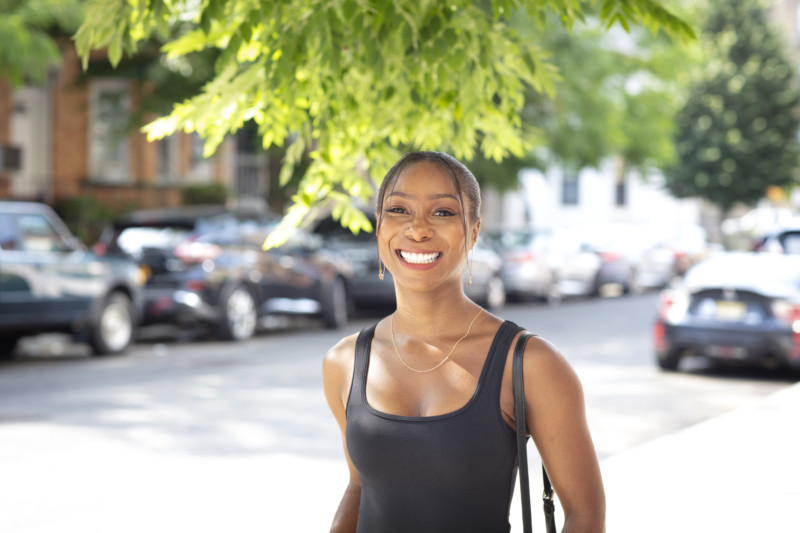
Kayla Thomas outside her apartment in Flatbush, Brooklyn. Photo by Matthew Septimus
Kayla Thomas grew up in the Crown Heights and East New York neighborhoods of Brooklyn. Since turning eighteen, she has been a registered voter, but this will be the first mayoral election in which she has participated. “I think outside of general elections and presidential elections, I have a really hard time finding information and knowing what’s happening,” she said.
Thomas had become aware of the campaigns in April. “I had no idea we were up for an election until maybe a few weeks ago, when one of my college friends started posting about it on her Instagram Story. I was like, ‘Oh shit!’ ” When she started doing research into the race, seeking a leftist candidate, she clicked through her trusted friend’s Instagram Stories, then Googled information she wanted to follow up on. As far as news outlets, she said, “nothing stands out” as especially helpful. Instead, she preferred to go straight to the candidates themselves, reviewing the policy positions on their websites.
Thomas’s top three contenders were Dianne Morales, a nonprofit executive (“She’s also born and raised in New York, so I trust her”); Maya Wiley, a civil rights lawyer; and Art Chang (“I don’t know if people see him as a viable candidate or not”). She was also considering Garcia, Scott Stringer, and Jocelyn Taylor.
When it comes to non-mayoral news, Thomas said, she relies mostly on breaking-news push notifications and browses through links that her friends post to Facebook and Instagram. “I haven’t really seen any notification, that I’m aware of, about the coming mayoral election,” she said. She has spotted two campaigners in Brooklyn, though neither was running for mayor. As for endorsements? The ones that matter to Thomas come from Alexandria Ocasio-Cortez, the Democratic Socialists of America, the Working Families Party—sources outside the press.
Paul Johnson, 72, retired church staff
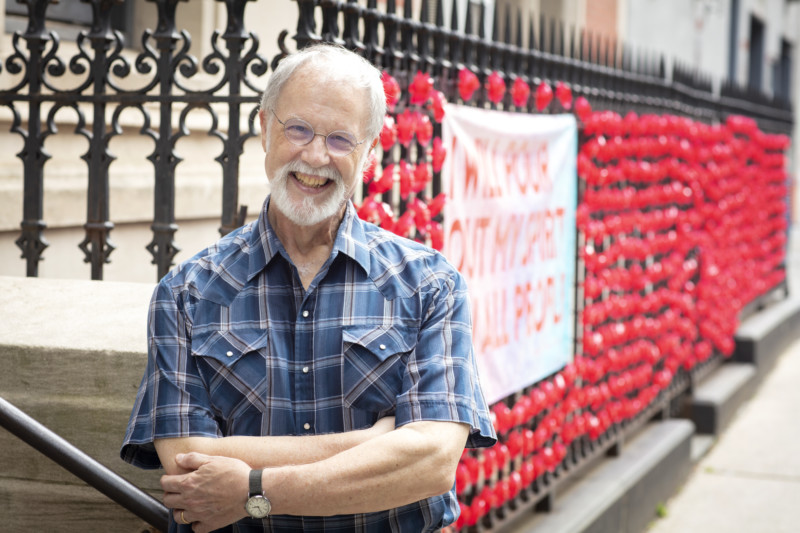
Paul Johnson outside All Angels’ Church on the Upper West Side of Manhattan. Photo by Matthew Septimus
Paul Johnson and his wife, Mary, have lived in the same apartment on the Upper West Side for forty-seven years. They’ve voted in almost every primary and general election since 1972. His media habits have held pretty steady. “We are faithful watchers of NY1 in the morning,” he said. “I receive the New York Times delivery. I like a physical paper.” Sometimes the news finds him: “There are the flyers on the streets and the various people who are busking, if you will, for their candidate.”
For down-ballot races, Johnson is weighing political endorsements alongside newspaper coverage: Alvin Bragg, a candidate for Manhattan district attorney, has won Preet Bharara’s endorsement, but Johnson has seen scant reporting on him. That’s less of a problem for him for the mayoral primary. “Fortunately, the Times has run articles on single candidates, so you get a much bigger, more complete picture of the various people.” Johnson was leaning toward Garcia. “I will say that I have a bias against Andrew Yang,” he added. “I think we’ve tried out celebrity candidates, and it doesn’t really work very well. I don’t think he’ll be any worse than John Lindsay was. But I don’t think it’ll be much better, either.”
Johnson worries that his fellow citizens aren’t quite so discerning. “Unfortunately, in these times, people who don’t take an interest in the race will go with the most superficial thing they hear. Andrew Yang’s out in front—‘Oh, well, he must be the guy.’ And why is he up front? Well, most people knew his name. It’s a circular thing.”
Cory Spicer, 32, former restaurant worker now in Web development
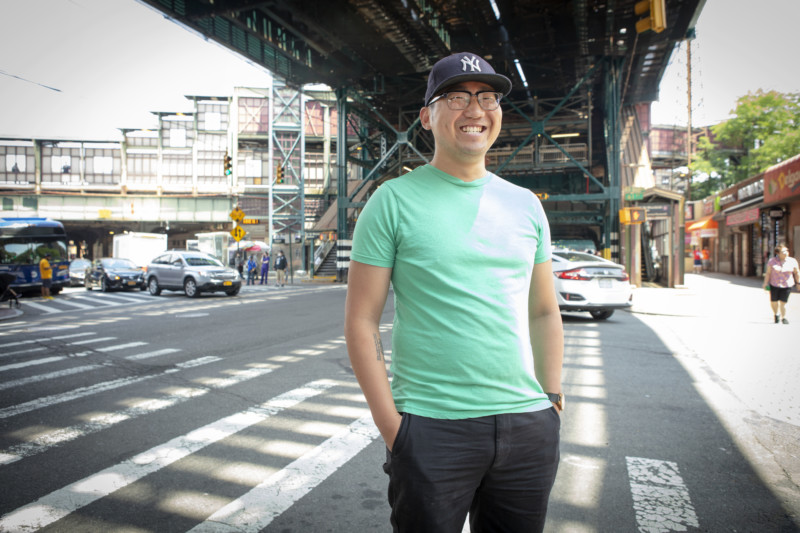
Cory Spicer underneath the 7 train in Woodside, Queens. Photo by Matthew Septimus
Cory Spicer has lived in New York for nearly ten years; he’s currently in Woodside, Queens. He reads the New York Times and Washington Post every day. “I feel more established places, like the Times and like the Post––don’t get me wrong, they’re a business too, and they want people to go to their websites––but I feel like they’re less motivated by clicks, or are less influenced by one single click.”
Spicer also browses Reddit, Twitter, and Instagram, where he’ll stumble upon information and commentary. But he doesn’t rely on those platforms for news. (Unless it’s about Survivor. “I follow every single person who has ever played the reality television show Survivor,” he said. “Every single one of them.”) He describes his engagement with local politics as “passive,” but a few names he spots on signs around his neighborhood stand out. He last voted in a local election––city council––when he lived in the Bronx: “My friend’s uncle was running, and I wanted to support my friend, I guess.” This year, Yang has caught his eye. “I want to see someone who looks like me, who understands how I’m perceived by other people,” Spicer, who was born in Korea, said. “That’s really important to me.” But so are candidates’ policies, he added. “I’ll do a Google search and kind of see what they’re about.”
He’s not yet sure who has won his vote. “I do not like many of the candidates, from what I have gleaned from them,” he said. For updates, he’s sticking with his go-to: “I think the New York Times is a really great paper. They publish a lot of articles that are meant to be like, Here’s a broad, sweeping sort of examination of the situation.” He tries to keep an open mind. “Candidates with big names, like Scott Stringer or Andrew Yang, end up getting lots of lines about them, and then other candidates don’t get as much written about them because their chances of getting elected are much lower. But I am definitely the type of voter who would cast a vote for, like, a lost cause.”
As for endorsements, Spicer is aware of them. “It doesn’t matter to me, because there are some issues––I wouldn’t say I’m a single-issue voter or anything like that, but I will say, for me specifically, defunding the police is very important.” He added, “The interests that matter to me are violence against Asian Americans, and the police gassing us last summer.” Newspapers, he figures, don’t always share those priorities.
Carmen Hernandez, 58, pastor and community organizer
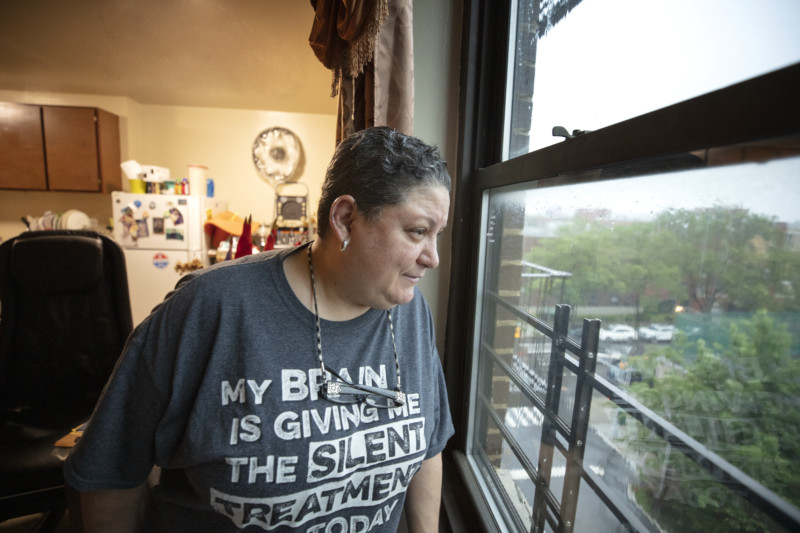
Carmen Hernandez in her apartment in Soundview, the Bronx. Photo by Matthew Septimus
Rev. Carmen Hernandez was born in Puerto Rico and has lived in New York City since she was six months old. She spent her early years in East Harlem; at eighteen, she moved to Soundview, in the Bronx. A longtime activist, she founded a tenants’ association and an advocacy nonprofit called the NYC LGBTQS Chamber of Commerce Inc.
Hernandez has her eye on just one candidate in the race: Adams. “Because he did the right thing—he came and met with me and other tenants,” she said. “The problem here with these candidates is that they’re so out of touch. They think taking a picture with a movie star—that that’s going to impress us.” She keeps up with the news primarily on Facebook and shares articles from all over: Good Morning America, the Washington Post, People, BET News, progressive YouTube channels like Brave New Films. She used to like NY1, but, she said, “They’re not being fair with any candidates.” Lately she’s preferred Channel 4, the local NBC station. “I have to be watching what’s going on with the Latino community,” she explained. “They got a lot of Latinos there. You see a little bit of everybody up in there.”
But Hernandez doesn’t rely on the press to stay informed. “News comes to me,” she said. “All these campaign people come to me for my support.” Newspaper endorsements don’t influence her. “I don’t follow where everybody leads.” Of journalists, she added, “Those people are out of touch as well. What do you think, reporters aren’t sellouts too?”
Jerry McMillan, 57, partner at a consulting firm
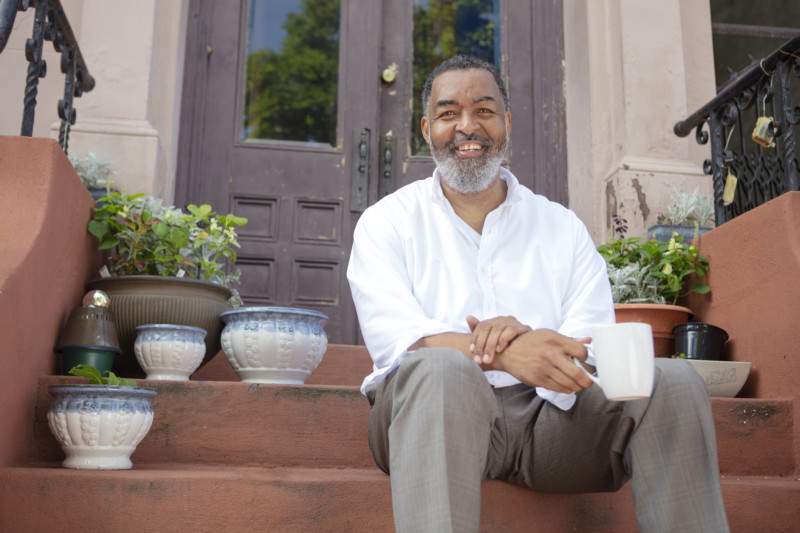
Jerry McMillan on the stoop of his apartment in Bedford-Stuyvesant, Brooklyn. Photo by Matthew Septimus
Jerry McMillan was raised in East Flatbush, Brooklyn, and has lived in Bedford-Stuyvesant for the past thirteen years. “I love it here,” he said. “Being a native New Yorker, I’ve dedicated my life to mentoring and developing kids from diverse backgrounds.” In the mayoral race, he’s had his eye on four candidates: Stringer, because of his familiarity, as New York’s comptroller, with the city budget; Adams, for his work on police reform; Yang, for his willingness to explore a universal income; and Ray McGuire. “Ray was extremely, extremely successful in the banking world, and you have to applaud that,” McMillan said. Still, he had his doubts. “I haven’t encountered a lot of people of color at the managing-director levels who credit Ray for guiding them and helping them. The fact that so many people of color have to ask, ‘Who is this guy?’ because he wasn’t visible during his years at CitiGroup and doing things in our community––that’s a little concerning to me.”
McMillan has been staying informed about the candidates by browsing news sites online. “The Post, the Daily News, the Times—NY1 has had some brief introductions of candidates,” he said. “I follow them with an understanding that the writers and editorial papers are biased. I think the Daily News is a little more sensitive to racial equality, living below the poverty line. I think that the Post is a little more Republican in nature. And I think the New York Times gives good editorials on candidates—I guess somewhere in between the Post and the Daily News. Think about it: How many cities have three papers? That’s how big this city is. You get different stories about each candidate in different papers.”
He wanted to factor in newspaper endorsements. “Adams has worked very closely with the Post; I’m not surprised that the Post is endorsing him,” he said. “I didn’t know the Times endorsed Garcia. That’s interesting.” He’s worried, though, that the city, and the press, have not done enough to explain ranked-choice voting. It’s a good system, he said, “but this year, I think it’s going to be a process that could hurt—simply because you’re going to have one candidate that you like in your mind, then you’re going to find out you have to rank the other four or five. You’re gonna struggle with that on Election Day.”
Madiba Dennie, 29, attorney
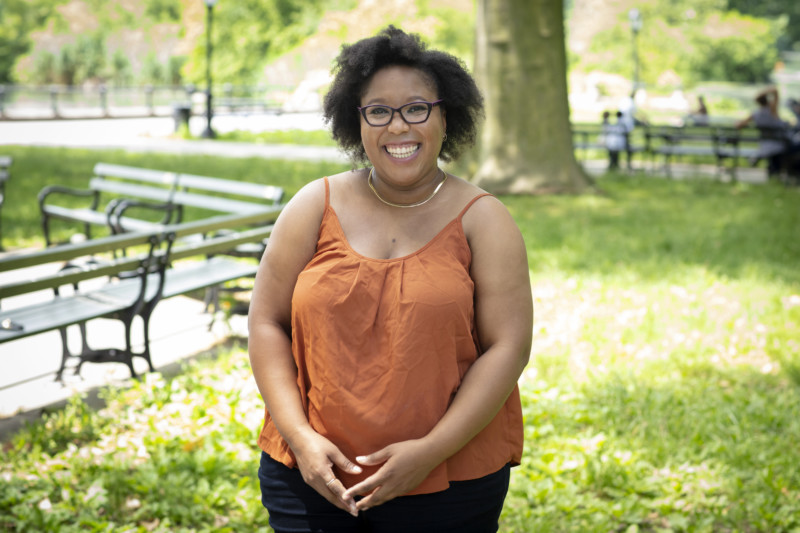
Madiba Dennie in Prospect Park, Brooklyn. Photo by Matthew Septimus
Madiba Dennie, a lawyer focused on racial and social justice, lives in Prospect Park South, in Brooklyn. “I guess I’m particularly likely to be a high-information voter, and yet I was still getting new information days ago––last night, even.” There’s been a lot to catch up on. “My news sources are usually national in focus,” she said. “But that doesn’t work the same way for your local mayoral election.” A major source for her has been THE CITY, a nonprofit local newsroom; she enjoys their “Meet Your Mayor” quiz. “I found that sometimes there were some candidates that I had actually never heard of before.” She also started checking out New York’s campaign finance board, where candidates register to run for office. And then there’s the always-reliable source: “I can use some of my friends as a screening mechanism in terms of who is worth finding more information about.”
Until recently, Dennie was sure who she’d rank as her first choice: “I was fully on board the Dianne Morales train.” But in recent weeks, several of Morales’s top staffers have left the campaign, citing union-busting, sexual harassment, and racial discrimination. Dennie didn’t like what she was hearing, but it was hard to understand what, exactly, was happening. “I had to rely on Twitter to see posts about the Morales union to see what was going on,” she said. For now, she plans to rank Wiley first and Morales second.
Dennie doesn’t see newspaper endorsements as an influence on her decision-making. But, she said, “to their credit, if it was an endorsement for a candidate I had wanted, like if it was for Dianne Morales or Maya Wiley, I probably would have taken that flag and waved it and been really pumped about it.”
Gary Stark, 41, boxing instructor
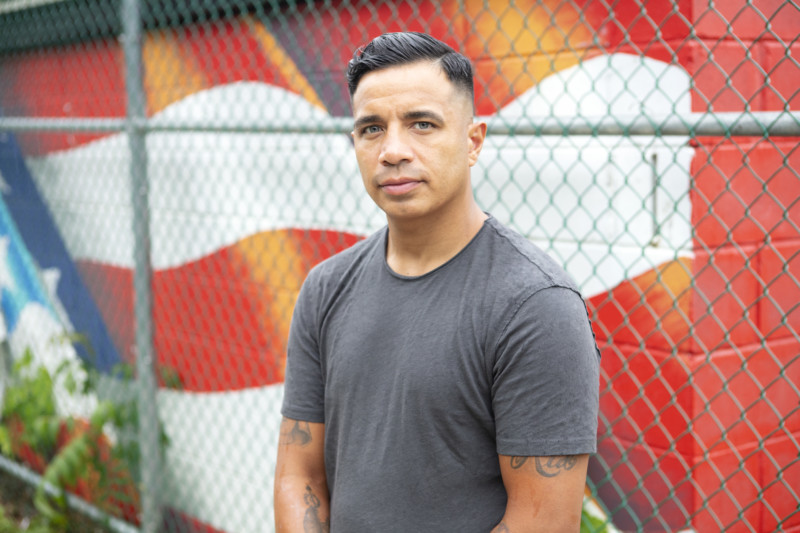
Gary Stark near Clove Lakes Park, in Staten Island. Photo by Matthew Septimus
“I’m forty-one years old, but I look twenty-one,” Stark said. “I live in Staten Island—born and raised in Brooklyn and Staten Island.” For sixteen years, Stark was a personal trainer at Chelsea Piers; when the pandemic exploded, the gym furloughed him. A former professional boxer, he has now returned to his roots, training clients in the sport. “And my wife also has her own company. So now we’re two CEOs of our companies and have two kids”—seven and two. “Every day is stressful.”
Stark doesn’t have too much time for the news. He joked: “There’s newspapers? I thought it was obsolete; I thought it was something old people do.” He does keep up with national stories, and he tries to maintain a balance between MSNBC and Fox News. “But when the TV is on, it’s on Toy Story for the millionth time, or Monsters, Inc.” Last year was the first time he had voted in an election. “I voted for Biden, ’cause I couldn’t have it no more.” As for New York City: “I think all New Yorkers, Republicans and Democrats, can agree that de Blasio is the worst mayor ever.”
He wasn’t sure who all the candidates were in the upcoming election, but he was sorry that Max Rose––a moderate former Democratic congressman in his district––wasn’t running. “I went to school with Nicole Malliotakis. She wasn’t very friendly in high school, so she’s probably not gonna get my vote.” (Malliotakis, a conservative Republican, beat Rose for the congressional seat in 2020.)
Stark knew of some other contenders in the mix—“I like Yang all right,” he said. He asked who was running on the Republican side. His thoughts on Curtis Sliwa: “Wait up, wait up. The Guardian Angel guy? I’m sorry, excuse my French, get the fuck out of here!” It could be worse, though: “Greene”––Marjorie Taylor Greene––“isn’t running, right? I’m just playing. She’s horrible.”
Savannah Jacobson is a contributor to CJR.


